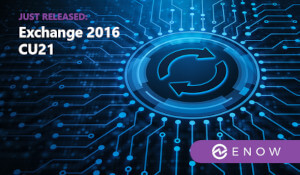What You Need to Know About CU21 for Exchange 2016

AmyKelly Petruzzella

As hopefully many of you already know Exchange Server 2016 entered the Extended Support phase of its product lifecycle on October 14th 2020. During Extended Support, products only receive updates defined by the Fixed Life Cycle. For Exchange Server 2016, the Fixed Life Cycle will include any required product and security updates and time zone definition changes. With the transition of Exchange Server 2016 to Extended Support, the quarterly release schedule of cumulative updates (CU) will end.
The last planned CU for Exchange Server 2016, CU21, was released on June 29, 2021. This cumulative update includes fixes for non-security issues and all previously released fixes for security and non-security issues. Microsoft encourages Exchange Server 2016 customers to adopt CU21 as soon as possible to ensure uninterrupted delivery of any future security related fixes. Only CU21 or its successors will receive updates. During the Extended Support phase, only the latest CU is eligible to receive updates once the standard 3 month transition period of the prior CU has lapsed.
Known Issues in CU21 Update
In multidomain Active Directory forests in which Exchange is installed or has been prepared previously by using the /PrepareDomain option in Setup, this action must be completed after the /PrepareAD command for this cumulative update has been completed and the changes are replicated to all domains. Setup will try to run the /PrepareAD command during the first server installation. Installation will finish only if the user who initiated Setup has the appropriate permissions. Read more here.
- Autodiscover Event ID 1 occurs. Read more here.
- "500 Unexpected Error" when trying to create a user mailbox in ECP. Read more here.
- "Cannot Send Mail - Your mailbox is full" error when you use iPhone mail to send very large attachments. Read more here.
Get Cumulative Update 21 for Exchange Server 2016:
- Download Center
- Download Cumulative Update 21 for Exchange Server 2016 (KB5003611) now
- Download Exchange Server 2016 CU 21 UM Language Packs now
If you cannot move your mailboxes to the cloud and you plan on keeping mailboxes on-premises, then you really should be moving to Exchange Server 2019 and using that for both mailboxes and hybrid connectivity. That way you get full support including non-critical bug fixes and get ongoing product improvements.
Exchange 2016 to Exchange 2019 Migration Considerations
There are some cool new features in Exchange 2019 that may well make it worthwhile for organizations committed to on-premises Exchange server.
Support for SSD hard drives, support for non-English characters, and support for running Exchange on Server 2019 core can all be compelling reasons to upgrade to Exchange 2019 if your organization is committed to staying on-premises.
Summary
As always, we recommend you test the cumulative update in your test environment thoroughly, to determine the proper installation process for your production environment. For best practices for successful installation, please see this document. Note: If updating from an older version of the CU, please see Exchange Update Wizard for detailed steps to follow.
Also, to prevent installation issues you should ensure that the Windows PowerShell Script Execution Policy is set to Unrestricted on the server being upgraded or installed. To verify the policy settings, run the Get-ExecutionPolicy cmdlet from PowerShell on the machine being upgraded. If the policies are NOT set to Unrestricted you should use these resolution steps to adjust the settings.
If you plan to install the update with the unattended install option using either PowerShell or a command prompt, make sure you specify either the full path to the setup.exe file or use a “.” in front of the command if you are running it directly from the folder containing the update. If you do not, Exchange Setup may indicate that it completed successfully when it did not. Read more here.
More resources: ENow’s Microsoft Exchange Blog
Exchange Hybrid and Office 365 Monitoring and Reporting
On-premises components, such as AD FS, PTA, and Exchange Hybrid are critical for Office 365 end user experience. In addition, something as trivial as expiring Exchange or AD FS certificates can certainly lead to unexpected outages. By proactively monitoring hybrid components, ENow gives you early warnings where hybrid components are reaching a critical state, or even for an upcoming expiring certificate. Knowing immediately when a problem happens, where the fault lies, and why the issue has occurred, ensures that any outages are detected and solved as quickly as possible.
Access your free 14-day trial of ENow’s Exchange Hybrid and Office 365 Monitoring and Reporting today!

AmyKelly Petruzzella
AmyKelly Petruzzella is a marketing executive who focuses on Microsoft Exchange, Office 365, and Active Directory trends, challenges, and business outcomes for enterprises. Over the years, AmyKelly regularly engages with Gartner industry analysts, and she has been recognized several times for Top 50 Microsoft Marketing Excellence. She is a frequent speaker and blogger and an industry veteran who advocates for women in technology.
Related Posts


Ignite 2019 Wrap-up

Jeff Guillet MVP, MCSM
After months of planning, Microsoft completed another successful Ignite event in Orlando, Florida....

